Really Hearing Your Employees

Human beings need to have a purpose, they need to matter. When we feel irrelevant or unimportant our energy and commitment tank. We accomplish less. We are less kind and less patient. When we are heard, when someone pays attention to our emotions, our actions, our experiences, or our suggestions, we feel valued. We feel that we have worth as a person.
Everyone experiences not being heard. The one not hearing us may be our child, partner, friend, neighbor, acquaintance, teacher, doctor, customer, employee, colleague, boss, or stranger. If an acquaintance or stranger doesn’t notice us or listen to us, it is usually not a big deal. They aren’t part of our daily life so we have no need to be valued by them. But when we feel undervalued by members of our household, our close social circle, or a colleague who is important to our workplace success, the quality of our life is impacted.
Employees may be excited to tell their boss they have finally mastered a key task, but we don’t take two minutes to hear about it and acknowledge their success. They may be struggling to understand an assignment, be completely stuck on the next step, need a technology upgrade to handle the current volume of work, or have an innovative idea that could enhance productivity and the bottom line, but we don’t listen to their bottlenecks and provide the support that would help them achieve company goals. Your team member may wish to ask if they could do their end-of-day paperwork remotely the week their children’s after-school babysitter is on vacation. Perhaps it would be a relief if they could come in half-an-hour later the week their take-the-kids-to-school carpool parent recovers from surgery. How open are we to helping reduce their anxiety so they can be more focused at work?
The job of supervisors and managers is to help their employees be successful. When we don’t take time to hear them out, to consider their requests and their ideas, we become their biggest bottleneck. You may not realize that as leaders, we control 70% of the factors that affect our team’s performance. Yes, our employees only control 30% of the factors that impact their results. Some research suggests that employees might control as little as 20%! How intentional are we about reducing the bottlenecks that our employees can’t control?
When employees incorrectly interpret our instructions regarding an urgent assignment, the emergency gets worse. If a virus or software update prevents them from doing important computer work, we may want them to focus on another high priority task.
When they figure out a way to improve results by tweaking a standard procedure, we might want to listen when they try to tell us about it before they teach their more successful method to everyone in two departments. When we suddenly assign an urgent task to busy experienced employees without helping them reprioritize their normal critical responsibilities, we are setting them up for failure.
Results-oriented employees seldom make excuses. If they say ‘but’ they are likely about to share a real bottleneck – a challenge they don’t know how to solve. They are interested in both the company’s success and their personal reputation and they are trying to figure out how to accomplish the increased workload or which tasks can be rescheduled or put on the back burner. As leaders, we need to be thankful they are sharing their concerns with us and asking for help. In a few minutes, we may be able to put their mind at ease so they can focus on the priorities at hand. Without our help, their mental overwhelm or under-informed decisions may negatively impact the speed and accuracy of their work for days.
When we make a habit of not listening to employee concerns or not considering their ideas, they often feel that we don’t want them to be their best, to solve problems, or improve performance. They stop asking questions to clarify expectations and understand the context of their work. They stop trying to engage or innovate. They stop trying to be open, honest, and collaborative. Eventually, they decide to either cope with their workplace disappointments or join the great resignation.
Leaders have the greatest impact on employee retention. Our job is to equip and support our employees for success, not to spur failure and disenchantment. It is important that they feel valued for sharing their challenges and ideas for improvement. We have to ensure they feel heard.
What is one thing you can do differently to help your employees feel heard?


